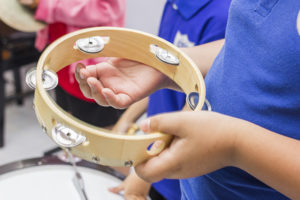Music Therapy Improves Communication, Social Skills for Young Girl

 This winning story about music therapy was received during our 2016 summer story contest by Rachel Rotert, Music Therapist at Camber Kansas City (previously KVC Hospitals Kansas City). The client’s name in this story has been changed to protect her privacy.
This winning story about music therapy was received during our 2016 summer story contest by Rachel Rotert, Music Therapist at Camber Kansas City (previously KVC Hospitals Kansas City). The client’s name in this story has been changed to protect her privacy.
When Natalie was 11, she was putting herself and others at risk on a regular basis. She would kick, hit and bite people at school. She would hurt herself by banging her head into things and clawing at her own arms. This young lady was often angry at the world around her, and understandably so because her ability to communicate was severely limited.
Join our team of extraordinary healthcare professionals making a positive difference! Browse our job openings and apply today!
At an early age, Natalie was diagnosed with Autism Spectrum Disorder and Congenital Deafness. It was very difficult for her to communicate her needs to others. She also found it difficult to respond correctly to the cues and expectations of others. On top of these challenges, Natalie had been neglected by her family during her first five years of life. She did not receive proper nutrition, nor did she receive early intervention services that would have allowed her to learn sign language or other adaptive communication skills.
A judge decided to remove Natalie from her parents and place her in foster care. It was later determined that safely returning home was not an option. Natalie was matched with an adoptive family, and they tried to provide her with the education and behavioral health services she needed to thrive. The family required a significant amount of support to fully equip Natalie to work through her extensive learning, communication and trauma recovery challenges. Last year, her aggression increased, making it unsafe for her to remain in her school. Her parents decided to seek professional help from a psychiatric hospital.
While receiving treatment at the hospital, Natalie’s aggression and self-harming behavior continued to increase and she was transferred to Camber Kansas City. The first time I met Natalie during a music therapy group, I noticed how agitated she appeared most of the time. She was working with an interpreter, but Natalie never looked toward them or anyone around her to attempt to sign or communicate. She had shut herself off from the world around her. She continued to behave aggressively toward staff from time to time, but the team demonstrated understanding and patience at every point of Natalie’s treatment.
 A turning point in Natalie’s treatment came when I allowed her to strum a guitar. When she realized she could place her non-strumming hand on the guitar body to feel the vibration of the music, she was delighted to participate. Not long after, Natalie would sign “guitar” and smile broadly whenever she saw me. She responded so positively and powerfully in music therapy groups that her primary therapist referred her for individual music therapy services. Knowing that her ability to hear the music would be limited, I was challenged to seek out instruments and interventions that would engage the young girl’s visual and tactile senses while helping nurture and motivate her emerging communication skills. Interventions were also designed to offer Natalie healthy choices, leadership opportunities, and empower her to feel positive about her abilities.
A turning point in Natalie’s treatment came when I allowed her to strum a guitar. When she realized she could place her non-strumming hand on the guitar body to feel the vibration of the music, she was delighted to participate. Not long after, Natalie would sign “guitar” and smile broadly whenever she saw me. She responded so positively and powerfully in music therapy groups that her primary therapist referred her for individual music therapy services. Knowing that her ability to hear the music would be limited, I was challenged to seek out instruments and interventions that would engage the young girl’s visual and tactile senses while helping nurture and motivate her emerging communication skills. Interventions were also designed to offer Natalie healthy choices, leadership opportunities, and empower her to feel positive about her abilities.
After our first music therapy session together, it was clear that this chapter of Natalie’s treatment would be incredibly fun and beneficial. She began to master each music intervention quicker than anyone could have expected. Natalie would improvise freely on an instrument and then I would initiate communication by matching her musical ideas. She figured out quickly that she had a significant amount of control over the music. Natalie would often laugh and smile while leading me through her musical creations. From this initial rapport-building intervention, I gradually challenged Natalie to follow my musical cues, make eye contact more frequently, and actively focus on memorizing and repeating rhythmic patterns. Each of these challenges was presented through fun musical games and gradually, Natalie became confident in her ability to initiate communication with others and stay emotionally regulated throughout the day, making her aggressive behavior less frequent. She also started to engage more in other therapeutic services including seeing a tutor to learn to communicate more effectively through sign language and participating in the Camber Academy, easing her into a learning environment with few triggers and a high level of individualized care.
During her final week, Natalie surprised everyone during a music therapy group by agreeing to lead her peers in a song improvisation with tone chimes. She drew upon the skills I had practiced with her, and I watched as she smiled, stood up straight, and pointed confidently at her peers to conduct the song and bring her musical ideas to life. Later that week, I met with Natalie for her final individual session. She went beyond her usual demonstration of assertive leadership during rhythm games and spontaneously initiated a turn-taking interaction in which she presented a musical thought and then fell silent, paying attention to my response. At the end of our session, Natalie hugged me, looked me in the eye and signed the following: “Thank you. I had fun. I am going home with my parents tomorrow. Goodbye.”
Natalie was a delight to work with and many of us at Camber Kansas City miss her greatly. Her transformation was inspiring to witness, and I am incredibly proud we were able to send this young lady safely back home to her family with a new set of skills and tools to help her succeed.
Each year, Camber Children’s Mental Health (previously KVC Hospitals) serves thousands of children who are struggling with depression, anxiety, the impacts of trauma, suicidal thoughts, and other mental health needs. Our experiential learning programs make treatment engaging and teach new skills for processing trauma, managing difficult emotions and moving beyond traumatic experiences.




